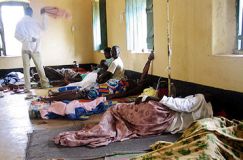Children at risk from cholera outbreak in S. Sudan: UNICEF
June 28, 2015 (JUBA) – At least 18 people, including two children less than 5 years died from cholera in the recent outbreak in South Sudan, the UN Children Fund (UNICEF) said.
 According to UNICEF, the first cholera case was reported on 27 May in the Protection of Civilians (PoC) site in Juba. Since then, 170 suspected cases have reportedly been recorded inside the site and in villages across Central Equatoria State.
According to UNICEF, the first cholera case was reported on 27 May in the Protection of Civilians (PoC) site in Juba. Since then, 170 suspected cases have reportedly been recorded inside the site and in villages across Central Equatoria State.
UNICEF and the World Health Organisation (WHO) reportedly mounted an immediate outbreak response, led by the health ministry, to provide lifesaving health supplies and scale up preventative measures including cholera vaccinations and hygiene promotion.
“Up to 5,000 children under five are at risk of dying from cholera unless urgent action is taken to contain this threat,” said UNICEF South Sudan representative, Jonathan Veitch.
“It is deplorable that such an easily preventable disease could destroy so many young lives,” he added.
Children under five years of age reportedly account for 15% all suspected cholera cases.
Cholera, health official say, is particularly dangerous for young children as it causes rapid and severe dehydration due to excessive diarrhoea and vomiting.
UNICEF and partners are said to be supporting the establishment of Oral Rehydration points and have trained health care providers. They have also delivered cholera treatment supplies, including medicines, soap, protective equipment and tents to hospitals throughout the country.
An estimated 30,000 internally displaced persons in the Juba PoC site will receive the Oral Cholera Vaccination. Hygiene promotion, including hand-washing and the safe handling of food is ongoing.
“The response urgently requires additional funding to ensure the outbreak is contained, especially as rainy season conditions increase the risk of transmission between now and November,” the agency said in a statement extended to Sudan Tribune on Friday.
South Sudan recorded no cholera cases between 2009 and the end of 2013. However, the conflict which started in December 2013 pushed hundreds of thousands of people from their homes, forcing them to seek shelter in overcrowded camps and settlements, often without access to clean water and in poor hygiene conditions. A cholera outbreak in May 2014 killed 167 people before it was brought under control by the Ministry’s national cholera task force including UNICEF, WHO as well as other partners.
UNICEF said it urgently needs $4.6 million to fund an emergency cholera response for six months.
“UNICEF is working with communities and health facilities to prevent further loss of life but we are running out of funds to stop this,” Veitch stressed.
(ST).
